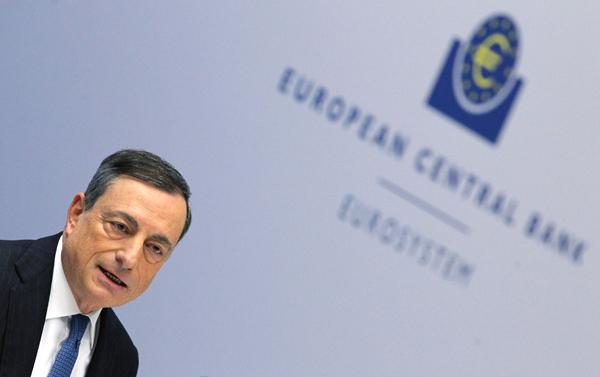You are here
ECB's Draghi signals end to rate cuts
By Reuters - Mar 10,2016 - Last updated at Mar 10,2016
FRANKFURT — European Central Bank (ECB) chief Mario Draghi unleashed a bold easing package on Thursday, cutting rates and expanding asset buys, but undid the very stimulus he hoped to achieve by suggesting there would be no further cuts.
That comment drove the euro to unwanted gains against the dollar and prompted criticism from some that Draghi, who already in December disappointed markets by under-delivering, had once again botched his communication.
Seeking to resurrect corporate activity and investments, the ECB said it would start buying corporate debt and even offered to pay banks for lending to companies in the ailing euro area in a bid to kickstart growth and stave off the threat of deflation.
The bank has sought for three years to push inflation up to its target level, spending 700 billion euros on asset buys in the past year alone. But it has been to no avail amid weak investment, high unemployment, high debt and productive slack in the economy.
Draghi announced that ECB staff had slashed its inflation and growth expectations, predicting that even with fresh stimulus, price growth will not reach its target for years to come and growth will slow.
Markets initially cheered the package but reversed course after Draghi hinted the ECB was done cutting rates and ruled out a tiered deposit rate structure — a system of multiple rates already used in Switzerland and Japan to encourage lending to companies, while also punishing banks that hold too much cash.
"Rates will stay low, very low, for a long period of time and well past the horizon of our purchases," Draghi told his regular post-Council news conference.
"From today's perspective and taking into account the support of our measures to growth and inflation, we don't anticipate that it will be necessary to reduce rates further," he said.
The euro reversed course on Draghi's comments and firmed close to 1.5 per cent. Eurozone stock fell by 1.5 per cent and euro area bond yields soared — all effectively tightening monetary conditions and so going counter to Draghi's aims.
Delivering above expectations, the ECB raised monthly asset buys to 80 billion euros from 60 billion euros and cut its main refinancing rate to zero from 0.05 per cent. It also cut its deposit rate by 10 basis points to -0.4 per cent and shaved the marginal lending rate, used by banks to borrow from the ECB overnight, to 0.25 per cent from 0.3 per cent.
"Where the ECB disappointed was on the forward-looking signal on rates and on its inflation target," JPMorgan analyst Greg Fuzesi said, arguing that the ECB should have argued for tiered deposit rates as a way to protect bank earnings while giving the ECB room to cut further.
"This is disappointing as the ECB could have added a different spin, emphasising that a tiered deposit rate system limits the direct cost to banks and that the targeted long-term refinancing operations (TLTRO) help banks even further by providing very cheap funding," Fuzesi added.
Misfire?
Nicholas Spiro of Lauressa Advisory consultancy headlined his commentary "Draghi misfires his bazooka".
"For a central banker who prides himself on his verbal intervention skills, it beggars belief that Mr Draghi would commit the faux pas of ruling out further cuts in interest rates any time soon," he said.
The ultra cheap four-year TLTRO loans would be offered at an interest rate of zero, but banks lending out more than a prescribed amount will get a reduction worth up to the deposit rate, currently at minus 0.4 per cent.
"A bank that is very active in granting loans to the real economy can borrow more than a bank that concentrates on other activities," Draghi noted.
Sceptical Germans, the biggest opponents of ECB policy easing, quickly jumped on Draghi, arguing that the side effects of the stimulus could spoil the gains.
"The ECB's decisions are a heavy burden for savers and insurers," said Markus Soeder, the minister for finance in Bavaria, one of Germany's biggest states.
"They are a guide for financial speculation. The average wage earners and savers will have to pay for the European monetary policy. Under Mario Draghi, the ECB is more Wall Street than Bundesbank," he added.
Draghi answered such criticisms partly in German, arguing: "Suppose we had embraced the 'nein zu allem' ['no to everything'] policy strategy? We deem that the counterfactual would have been a disastrous deflation."
But he acknowledged the limitations of negative rates and said any future moves would likely have to focus on other, non-conventional measures.
"Does it mean that we can go as negative as we want without having any consequences on the banking system? The answer is no," he said.
The ECB's move came after the Group of 20 of the world's major economies last month agreed they need to look beyond ultra-low interest rates and printing money to shake the global economy out of its torpor.
The US Federal Reserve, the Bank of Japan, Bank of England and Swiss National Bank are all set to meet next week.
Related Articles
FRANKFURT — The European Central Bank (ECB) eased policy further on Thursday to fight stubbornly low inflation but kept much of its powder d
FRANKFURT — Eurozone banks are set to pay back on Friday just under 300 billion euros ($311 billion) in cheap loans paid out by the European
The European Central Bank (ECB) is likely to hold fire on new policy moves Thursday and leave a series of radical recent measures to take their course, despite pressure over a weak economic recovery, analysts say.
















